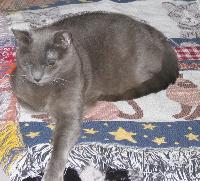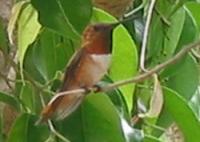September 20, 2007
Bruce at Wordswimmer writes about story endings in his post, Where the River Ends, and that got me to thinking about some of the problems I’ve encountered in ending mysteries.
With a mystery, the question of how to end the story begins with which character did the crime. I no longer start with a specific villain in mind. The story often changes so much in the writing that a pre-planned ending has no choice but to change as well, or it wouldn’t make much sense.
In the last couple of mysteries I’ve written, I was as surprised as anyone by who the villain turned out to be once I got to the second draft or later. That’s okay, and it has a lot to do with how I develop characters. If I know who the villain is too early, I’m in danger of giving it away, offering hints I’m not even aware of because of my judgments about that character.
If I start out thinking the villain isn’t a villain, I can get to the heart of that character sooner in my own mind. I can get to know him, let him grow and round out on the page. I’m an idealist, and I really like to see the best in people, so there needs to be that spark of sympathy first, without letting on even to myself that he or she is a killer in the making. I guess in that regard my characterization is as organic as raising a child. What mother imagines her infant would harm anyone?
This process forces me to explore the shadows, my characters’ shadows as well as my own, to see possible motivations, both conscious and unconscious.
I first encountered the shadow, as a human concept, in stories I read. I confess that I didn’t understand the concept very well when I was young and still in denial that I had a shadow or that any good person did. But one encounters this idea many times, if one reads at all widely, and the reason for that is it’s a universal truth about human nature.
In exploring the shadows, I’ve come to see that a fully rounded character, even if he’s the good guy, has a shadow, whether that shadow is clear on the page or not, whether that shadow is negative or positive. I want to know each major character’s background as well as possible, so I start with the positives and work my way into the negatives. Though it hurts me to watch a character I’ve come to like or sympathize with cross the line into murder, at least the biggest puzzle of the mystery isn’t lost on me, and I’m not giving the killer away up front. If I decide the murderer needs to be someone else, not the person I thought it was going to be, I don’t have to cast about too far for someone else who could have done it. In truth, any one of the characters might be capable of killing, given the right circumstances and motivation. They all have their shadows. By the time I get to my final draft, I usually have a few characters that, with nudges into poor choices and flawed rationalization, could become much darker individuals. That’s usually a key to how I end the story. Which character, which nudges, and which choices? Which fits this need best? What motivates the villain to do the awful deed and also causes him or her to get caught in the end? How will the reader be surprised and at the same time see that this person and the clues leading there were present all along? (Foreshadowing will have to wait for another post.)
My exploration of the shadows has made me think a lot about the choices we make in life, and how important each one is, especially when we stack one choice on top of another in the way that we sometimes come to think of as inevitable. We don’t have a choice in everything, certainly, but sometimes when we look back over our lives or a course of events, we can see the turnings we’ve made, and many of them were choices, that brought each of us to be who, where, and what we are today. When we’re accountable for those choices, I think we improve our ability to move forward and make better ones.
If there’s one positive effect fiction can have, perhaps it’s to get us to take a look at the cause and effect of choices. What are we capable of? What would we do in the same situation, and where might that take us or what might it make of us, and our world with us? The stories that get me to think in those terms are the stories that stay with me.
September 2, 2007
When I stopped commuting to a busy office and switched to staying home most days, I worried a little whether my new life would be too quiet or uneventful to suit me. But I’m never bored, and I’m sometimes amazed how much can happen right outside my door. I’ve been able to slow down, tune into the seasons, and let them slide gently past. I can be a mushroom, staying indoors and focusing on my inner world, as writers do when we’re working, or I can step right outside and find endless variety, especially in the forms nature takes.
I posted earlier this summer about hummingbirds. There have been lots of birds this summer. The mockingbirds twirled in cartwheel displays, showing off the white of their wings, and flew in wild, veering trajectories to catch cabbage white butterflies. They sang for hours on end, and swooped at anyone who ventured within range of their nests. A nearby rooster crows most mornings and sometimes all day. I’ve seen a phainopepla, a few hawks, loads of crows, orioles, black phoebes, brown towhees, and house finches. My husband saw a California thrasher, who sadly chose a rare time when I was at the post office to stop by for a snack of insects. Now and then a flock of common bushtits flies through, chittering in light tones. They never seem to sit still, and I like their tiny, perfect round shapes, so like the birds in picture books that I read as a child.
We’ve seen butterflies of all varieties this year, as well as plenty of bees, lizards, bats, and the tarantula hawk, and the summer has seen a variety of mushrooms sprouting in the yard, which seem to be able to blend in with their surroundings. (Click on images to view full size.)


Our daily visitors include the ubiquitous scrub jay.

I’ve noticed that a variety of clouds can inhabit different parts of the sky in the same moment.


I even got to thinking about the little fuzzy-edged ones, and wondered if painters who pour watercolor ever pour white gouache to make clouds. That sent me on a lazy search that introduced me to the work of artist Vickie Leigh Krudwig.
We’ve had our hottest weather of the year in the past two days, and today promises to be even hotter. Thirty minutes ago it was 97 degrees Fahrenheit outside. As I write this, it’s 99. Yesterday’s sighting of a swallowtail butterfly almost as big as my hand, and this morning’s sunrise, almost make up for the heat.


I’m attempting to ignore the fact that the sunrise was followed a few hours later by a 4.0 earthquake about 40 miles north of us, which jolted us to our feet. As I write this, thunderheads are forming just east, which looked like this an hour ago,

and like this half an hour later.

I don’t expect a triple whammy day of heat, earthquake, and thunderstorms. I’m looking for the next butterfly. But I may close the car windows just in case.
August 31, 2007
We had to say goodbye to our little gray cat Emily today. We think she was about 20 years old, but we’re not sure, because she adopted us just over nine years ago, appearing in our back yard to steal our puppy’s food. She had a lot of problems, resulting from having nearly starved on her own without front claws, and having possibly been abused. She was missing half her teeth when she found us, and we think she suffered the cat version of PTSD. But over time she warmed up to all of us and became an integral part of our family. We like to think we were able to give her a nice retirement here, after all her troubles. She helped us say goodbye to another dear cat friend, Merlin, in 2000, and today we said goodbye to her.
I’ll miss her purrs, her silky, silver-gray fur, and the gentle tap of her paw when she wakened me in the mornings.
Just a few nights ago, The Lord of the Rings trilogy played on television again. We didn’t watch, because I intended to watch our DVDs again soon, but we caught the tail end of Return of the King, and the final song.
For days that song has stayed in my mind, popping into consciousness at odd moments. Today it did again, and I wondered about it, because I couldn’t recall the singer’s name, the name of the song, or the lyrics. The music just kept haunting me. So I looked it up, and remembered as soon as I sat down to do a search that it was Into the West. Annie Lennox sang it for the film. I love this song. Right now it’s helping me say goodbye to Emily. I learned that it was partially inspired by the death of young New Zealand filmmaker, Cameron Duncan, and first performed in public at his funeral. That makes it seem even more appropriate as Emily’s song of passage.
Safe journey, little friend.
The song is available as part of the soundtrack from the film: The Lord of the Rings: The Return of the King [SOUNDTRACK]

August 14, 2007
I hate writing synopses.
As I understand it, most writers hate them. It’s difficult to pare down to a few pages the story that took you many hundred more to write in the way you think readers will best understand. It’s especially difficult for me while all the minute details and nuances are still very much alive in my mind. But agents want to see a synopsis first.
Some writers say a synopsis is easier to write before one writes the story, but I’ve always found that tricky, since my stories change as I write them. I outline the story that it turns out I didn’t want to write after all. The real story reveals itself as I go along.
But this synopsis may turn out to be a good thing, because it’s helped me see more that I want to cut. Maybe that’s what the agents really have up their sleeves, getting writers to analyze their stories from a different perspective. I’m heading back into editing mode. Good grief, this novel’s been through a lot of drafts. This will be the 9th, and it’s wearing me down. I’ll be glad to see the end of it.
August 1, 2007

According to my old bird guides, one of which dates back to a field biology class I took at eighteen or nineteen, this little guy isn’t supposed to be here. He’s supposed to be anywhere from Northern California to Alaska. But here he is, in Southern California. (Notice how we Californians capitalize the two regions, as if we wanted to be two separate states, like the Dakotas or the Carolinas?)
Anyway, he’s in the wrong place, I think. If it’s time for Rufous Hummingbirds to migrate to winter grounds, he’s supposed to be in Mexico, or on his way there. This feisty little Selasphorus rufus has claimed the territory around our feeder during the past two days. I’ve been paying attention to hummingbirds all my life, and we’ve fed them for years, here at the north end of the county and in the city of San Diego, but we never saw a Rufous before, at least not closely enough to identify it. With no green on his back (see below), he’s definitely a Rufous.


My photos don’t do him justice, though they might if he would sit still for a few seconds and let me focus. He’s a glowing reddish gold with an irridescent scarlet throat that could stop traffic. He’s faster than any of the other hummingbirds, and he doesn’t let them forget it.
Maybe his range has been thrown off by global warming, as this Smithsonian site seems to hint, or perhaps they’ve always been around and I just haven’t noticed.




July 27, 2007
My “Quickie” horoscope on Yahoo! this morning said,
“If you wake up feeling weird, just go with it!”
Hmm, okay, but I wake up feeling weird every morning, especially since I began working at home. I’m finally teaching myself to go with the flow, to let my days be unstructured and still get important things done. But now summer is here, the time of year when I wish I could hibernate and have someone rouse my half-baked body when it’s over.
I haven’t been posting as much because I’m in the midst of my yearly hot weather adaptation phase. That’s the excuse I’m going with. My dread of hot weather and my seeming inability to adapt make global warming and menopause at the same time feel like a horrid revelation that hell does exist, and I am going there. Go with the flow? I’m swimming upstream from the heat as fast as I can. This weather makes me miss the job at the office where someone else paid for the air conditioning, and paid me to be there in it. How cool was that?
I’m a slug this time of year. But last night, before I went to sleep, I thought it would be nice to wake up early and enjoy the cool of the morning. Apparently that set my mental alarm clock, and I wakened at dawn. This has happened a lot recently, deciding on a time to wake up, and waking at that time, without the alarm clock. It’s like a new super-power.
This morning was lovely, with the kinds of clouds I’ve heard called buttermilk skies, and a soft, cool breeze. I should use my super-power more often.
How do you go with the flow?
July 9, 2007
Gloria Steinem: In Defense of the ‘Chick Flick’:
“I propose, as the opposite of “chick flick,” films called “prick flicks.” Not only will it serve film critics well, but its variants will add to the literary lexicon.” (read article)
Maybe the term “prick” is too strong. It’s not the word I would’ve chosen, yet it answers the fact that a lot of women are put off by the tone and expression, if not the word, used when we hear the term “chick flick.”
Steinem’s editorial reminds me of something that occurred in a “Modern Fantasy” literature class I took, back in the seventies, when Mary Stewart’s first two Merlin and Arthur novels, The Crystal Cave and The Hollow Hills, were recent bestsellers. One of the young men in the class was so taken with them, he asked what other books Mary Stewart had written. I told him she’d written mostly romantic suspense in the past. I had an entire collection of her books at home, older hardcover editions gleaned from thrift store shelves. I thought when he expressed an interest that here was another new fan. But when the young man heard the word “romantic,” he took on a look of utter distaste and lost interest.
Some female mystery novelists still publish today using their first and middle initials rather than their full first names, in order to stretch past that still-existent gender barrier in many male readers’ minds, a practice reminiscent of the Brontës publishing under masculine names. One would’ve hoped that by the time this century rolled around we’d have advanced further. I don’t have statistics on this, but I’ll hazard a guess that there are more women who read and write fiction containing a predominately masculine point of view than there are men who read or write fiction containing a predominately feminine point of view.
Yet I know women, myself included, who enjoy a good action film, of the type once considered a favorite of men. Why is it that women, both in their reading and writing, as well as in movie preferences, might more readily cross old gender barriers?
Mind you, many men do take an equal interest in less violent or less action-oriented movies and books, and I admire men who are open to genres and interests considered historically feminine. I also admire women who open up more to interests previously considered masculine. More women today are sports fans than ever before, and don’t restrict their interests, as I do, to figure skating. My lack of interest is mostly due to bad experiences in physical education classes — I was that awkward, non-athletic kid always picked last for the team. It has nothing to do with my admiration of any outstanding achievement, physical or otherwise, and I enjoy watching good sports-related movies.
What is it that continues to keep some men from enjoying what they term as “chick flicks?” Is it that they truly don’t enjoy more thoughtful, slower-moving, or less action-oriented stories, once they give them a chance? Or is there another reason? Is it adrenaline addiction? (Understandable, among men and women, in today’s world, though perhaps best not encouraged.) Is it fear of what their friends will think? I’m trying not to make assumptions here. I’d really like to know, especially as a female writer trying to sell my fiction.
We all have types of stories we don’t like, or even parts of movies we like that we could do without. I personally back away from anything about child abductions, gangster movies that are overly violent onscreen, comedies that resort to tasteless bathroom humor (bathrooms have doors for a reason), and horror with too much blood and gore added for shock value. As far as I’m concerned, vomit and excrement belong off-screen. There’s enough of them in real life, and they’re not entertaining. They’re certainly not the kind of realism I’m looking for in a story.
I can understand someone not liking romance, even though I usually enjoy it provided it’s not overly sappy. But no one’s personal preference for certain types of stories and not others explains why we need the term “chick flick,” and especially not why it so often seems to be used as a derogatory term. Do the men who don’t like “chick flicks” prefer movies with only men? Is that what it boils down to?
I’m reminded of a line from Frank Herbert’s Dune regarding taking the “waters of life.” It mentions the place in their minds the Bene Gesserit mother superiors (women) fear to go, a place they believe only the fabled Kwisatz Haderach (a man) can access. The Kwisatz Haderach, once he accesses that place, becomes a superior being destined to lead his people to freedom. I wonder about the allegory Herbert intended, if any. Is there a place like that inside the female psyche, where some of the toughest men fear to go? Is that what they fear about “chick flicks?” Will they gain power if they find a way to access that, or will they lose power, possibly even die, as many men did who attempted to become the Kwisatz Haderach? Or will they simply gain a broader understanding of life and the world around them? In that case, maybe it’s worth a shot.
Gloria Steinem makes an interesting observation about power, and about nouns and adjectives in labels:
“Just as there are “novelists” and then “women novelists,” there are “movies” and then “chick flicks.” Whoever is in power takes over the noun — and the norm — while the less powerful get an adjective. Thus, we read about “African American doctors” but not “European American doctors,” “Hispanic leaders” but not “Anglo leaders,” “gay soldiers” but not “heterosexual soldiers,” and so on.” (read article)
July 7, 2007
A post by Susan at Spinning reminded me of a book I recently read, written by the Dalai Lama — The Universe in a Single Atom: The Convergence of Science and Spirituality. The Dalai Lama has nurtured a lifelong interest in science, and this book explores the gaps and meeting places between religion and science, in what I found to be a thoughtful and profound treatise. It was interesting to read how a religious leader views science, which sometimes threatens his long held beliefs and at other times seems to support them. Granted, Buddhism is one of the least dogmatic religions, and Buddhists don’t believe in a personal God or a specific creation myth, as far as I can discern from this and other readings, so he tends to be much more flexible toward science than other religious leaders might be.
I’ve often seen science as exploring the underpinnings, materials, and physical characteristics of the same great work of art (the Universe) that religious leaders and philosophers explore the ideas and impulses behind. Both, at their best, explore the best ways to live within that great work. To me their goals seem to mesh perfectly, so long as greed, dogma, and power plays don’t get in the way. But then I don’t have a set religious belief to try to fit everything into. I think the more set in concrete one’s beliefs are, in either science or spiritual teachings, the more difficult it may be to see the common ground and bridge the gaps. Flexibility is important, and we already know that some of the greatest scientific discoveries are results of either accidents or imagination. Einstein considered imagination more important than knowledge —
“I am enough of an artist to draw freely upon my imagination. Imagination is more important than knowledge. Knowledge is limited. Imagination encircles the world.”
Perhaps the most important way we’re made in any creator’s image is that we’re creative ourselves. It’s that very imaginative nature that can enable us to be flexible and love the mystery of life, rather than try to impose steadfast answers on others.
July 5, 2007
I decided to answer your comments in a new post, since some of my responses are lengthy. You’ve given me a lot to think about and helped me reconsider my feelings about critiques. Even though I disagree with some points, as they relate to my writing at this time, you all shared wisdom that deserves attention. (more…)
July 4, 2007
Reenie got me thinking about critiques today, specifically peer critiques of fiction.
As a technical writer and editor, I used to give and take strong, pointed, and mind-numbingly detailed critiques. That made sense, because what my coworkers and I wrote sometimes involved life or death safety procedures, or processes in which expensive equipment could be damaged if something wasn’t done right. We had to be precise, and could not leave room for interpretation or confuse anyone. There was no gray area. So I steeled myself and went through the review process. I found I could keep my emotions completely out of it, because I knew what was at stake, and it wasn’t about me. I always learned something.
Fiction is different — except that part about always learning something. (more…)
















